- Home
- Michael Wallace
The Emerald Crown (The Red Sword Trilogy Book 3)
The Emerald Crown (The Red Sword Trilogy Book 3) Read online
Table of Contents
Chapter One
Chapter Two
Chapter Three
Chapter Four
Chapter Five
Chapter Six
Chapter Seven
Chapter Eight
Chapter Nine
Chapter Ten
Chapter Eleven
Chapter Twelve
Chapter Thirteen
Chapter Fourteen
Chapter Fifteen
Chapter Sixteen
Chapter Seventeen
Chapter Eighteen
Chapter Nineteen
Chapter Twenty
Chapter Twenty-One
Chapter Twenty-Two
Chapter Twenty-Three
Chapter Twenty-Four
Chapter Twenty-Five
Chapter Twenty-Six
Chapter Twenty-Seven
Chapter Twenty-Eight
Chapter Twenty-Nine
Chapter Thirty
Chapter Thirty-One
The Emerald Crown
The Red Sword Trilogy #3
by Michael Wallace
Copyright ©2017 Michael Wallace
Balsalom Publishing
cover art by Jeff Brown
Chapter One
Chantmer was two miles east of the bridge over Blossom Creek when he first detected sorcery on the road. It was a dank odor that wafted through the air as the small company of wizards, apprentices, and acolytes entered a copse of trees. When they emerged from the other side, Chantmer glanced at the master, whose eyes were narrowed in suspicion. Memnet’s hands had disappeared into his sleeves, where he kept the glass orb that stored his power.
Narud, one of the other companions, glanced behind them and sniffed, almost animal-like, at the air. They had two acolytes with them to help move the library—Alyssa and Stephan—and even they seemed to note that something had changed, that some danger had found them. It was still early in the day, though, and their power was untapped. Between the five companions, it would take Toth himself to challenge them, so they continued on without comment.
They entered the village of Calianne. The master had cast a small concealer about the group before leaving the gardens, and so none of the villagers seemed to notice the travelers among them on the road. They passed boys with sheep, a man carting cabbages from a field, a blacksmith shop. Just beyond the smith, a farrier worked trimming a draft horse’s hooves and shoeing them.
Water gurgled through a millrace on the far end of the village, with the big, moss-covered wheel making lazy turns in the current. The sun was bright, and farmers lined up with wagons of wheat for milling, chatting and gesturing as they waited. A woman sold them cheese and bread. The whole village presented a cheerful, busy scene, deceptively normal with the capital of Aristonia occupied by Veyrian troops and the high king making war against the barbarians, burning the Sacred Forest, and attacking the order of wizards that had protected the khalifate for decades.
A stream marked the eastern edge of the village, and Chantmer had just stepped onto the wooden footbridge crossing it when he felt something stretched between the pillars sunk into the streambed. A cobweb of sorcery, invisible to the eye, but a dank, sticky spot to his magical senses.
Chantmer turned. “Master?”
“I feel it, too.”
Memnet the Great stepped ahead of the others and extended a hand. After a moment, he fell back a pace and stroked his honey-colored beard. The master looked younger since he’d emerged from the garden soil, as if the ground had been a second womb, but at the same time, he was still moving slowly, deliberately, an old man in a young man’s body. That impression of aching bones was fading, day by day—Chantmer had spent a few weeks in Syrmarria and noted a definite improvement when he and Narud returned to fetch help for the library—but it left him wondering just how much power the master had regained. So far, there was little evidence that he’d recovered his full might.
Memnet turned to Chantmer. “You discovered it, so you tell me what this does.”
Chantmer felt at the thing with his mind. The weblike sorcery had power in it, and wasn’t merely a ward to alert an enemy of their passing, but neither did it seem to carry a destructive attack.
“It’s a trigger for something else,” he decided at last. “Beyond that . . .?” Chantmer shook his head. “I don’t know.”
“A good start. Anyone else?”
The acolytes leaned in, brows furrowed in concentration. They still looked confused after several long moments.
“I can’t even feel it,” Alyssa confessed.
Chantmer raised an eyebrow. It was obvious; how could one not feel it? But he supposed that was why they were acolytes, and no longer apprentices. Narud studied it longer.
“It will weaken us for a later fight,” he said. “Like a corrosive potion poured over armor.”
Chantmer scowled, thinking Narud was probably right, but wishing he’d made the observation first.
“Which means there’s another, stronger trap up ahead,” Narud added.
“Not a trap. Not exactly.” Memnet glanced about him. “I’d say it’s more personal than that.”
Chantmer stepped forward, his feet thumping on the boards running above the stream. “I’ll take care of it.”
“No, let one of the acolytes.” Memnet eyed the pair. “You,” he told Stephan. “Do you know the incantation?”
Stephan frowned. “I know a spell, but probably not the one you’re thinking of. It’s bound to be clumsy.”
“I’ll give you the words of a better one,” Chantmer said.
“No need,” Memnet said. “Stephan’s incantation is adequate.”
Chantmer was not in a position to judge the master’s decisions, but even before Stephan called up the words, he knew it would be noisy. He winced as a big gust of power blasted through the little web and rolled up the road away from them. It would be ringing for miles if there were anyone listening. Stephan didn’t look happy as he wiped the blood from his palms onto the towel at his belt.
“Well,” Chantmer said. “That was . . . interesting. And pointless.”
“The rest of you go ahead,” Memnet said. “Be on your guard in case the enemy is nearby.” He put a hand on Chantmer’s wrist. “You, stay with me a moment.”
Chantmer waited impatiently until the others were out of earshot. “You may as well have given Stephan a trumpet and told him to march up and down the road playing at the top of his lungs—he wouldn’t have made any more noise. Why didn’t you let me do it and leave him out of it?”
“Do you want to know why Narud and Markal and Nathaliey are wizards and you are not?”
“What? Nathaliey . . .?”
“Your weakness isn’t your command or your knowledge of the lore. It’s your humility.”
“Nathaliey? When did she . . .? Wait, what do you mean my humility? Are you talking about that wasted spell just now? I’m stronger than Stephan in every way. Why should I pretend otherwise?”
Memnet held up a hand. “I don’t mean false modesty. Of course you’d have done it better than Stephan. And I’d have done it better than you. Less power to do the same thing, and I could have called it from the orb. So why have you do anything at all?”
“Presumably to help me learn. But Stephan isn’t an apprentice, he’s an acolyte. He’s not going anywhere. He’s a vessel for us to use, but he can’t do it on his own. So why did you let him blast away with that trebuchet of a spell?”
Chantmer knew his tone was bitter. He was still reeling from the news that Nathaliey was a wizard. She and Markal had disappeared with the red sword several
weeks ago, carrying it to Eriscoba to give it to Bronwyn’s order of paladins and keep it out of the hands of the marauders. She’d been an apprentice when she left, yet somehow she was now a wizard? How was that possible?
“I mean humility, Chantmer. You think you understand everything, and so you blunder forward on faulty assumptions because you refuse to stop and consider when you might be wrong.”
“I still don’t understand.”
“Exactly. Stop and think for a minute. Why did I have Stephan break apart that bit of sorcery when you or I could have done it more easily?”
Memnet clomped off the edge of the footbridge and onto solid ground. Chantmer followed, forcing himself to swallow his pride and consider the master’s lesson. The others had walked down the road a couple of hundred paces before coming to a stop. Narud was explaining something to the acolytes, who were listening intently.
“The noise was intentional,” Chantmer decided.
“Yes.”
“You knew the spell Stephan would cast, knew that it was blunt and noisy, and wanted to see if someone was listening. But that still doesn’t answer my question. You or I could have cast the same spell and made the same amount of noise with the same effect.”
“But what if the listener were clever enough to sense the difference between my magic and that of an apprentice or acolyte?”
“You don’t want them to know you’ve left the gardens.”
“That’s right. I want them to think that whoever is coming up the road is a lesser member of the order.”
They’d almost caught up with Narud and the acolytes. “Are you hoping to provoke a fight?”
“Our biggest danger isn’t entering the city, it’s leaving it with the books from the palace library. If there are enemies on the road, it will be more dangerous still.”
“So you want to fight them now, rather than later.”
“Exactly right,” Memnet said. “If we can ambush a dark acolyte or two, it makes the return trip easier. I used Stephan as bait to make sure it happens.”
Stephan looked up from his conversation with Narud and Alyssa. “Wait, I’m bait?”
Memnet clapped the acolyte on the shoulder. “Cheer up. You’re not a worm on a hook—I’ll be at your side. But yes, that spell of yours was meant to draw out our enemies.”
“I was wondering,” Narud murmured.
“See,” Chantmer said defensively. “I wasn’t the only one.” Memnet raised his eyebrows, and Chantmer cleared his throat. “I was just the one who said it aloud. But it wouldn’t hurt to explain these things ahead of time, that’s all I’m saying.”
“Can we at least discuss what you think we’ll face on the road?” Narud said. “And how we intend to fight it?”
“Very well,” Memnet said. The orb materialized, and he rolled it across his knuckles before it suddenly appeared in his opposite hand. “I sense three marauders and two dark acolytes. Come on, we’ll plan the fight as we walk.”
Memnet explained as they continued. He didn’t know exactly how powerful their enemies were, but seemed confident in his ability to defeat them. While he fought the dark acolytes, Chantmer and Narud would hold off the marauders, using Stephan and Alyssa as reservoirs of power.
“There’s a chance that another acolyte or more marauders are waiting on the road, hiding and ready to spring an ambush. If so, let them come. The more enemies we fight here, the fewer we face in Syrmarria or on the return. And the fewer who attack the gardens at a later date.”
Chantmer nodded, encouraged by Memnet’s confidence. Maybe he’d regained his strength after all.
“And if it’s King Toth himself?” Narud asked.
“Toth won’t have left Syrmarria—all his efforts are focused on bringing fire salamanders up from the depths. Salamanders hate the cold of the surface realms, and will fight to stay below. Every foot closer to the surface takes effort from the dark wizard.”
Narud’s thick black eyebrows bunched together. “That assumes your trick worked. If he realizes you’re on the road, what’s to say that he doesn’t forget about destroying the library and come to kill you instead?”
“I’ve thought of that,” Memnet said. “Sooner or later I must face him. If that happens today, so be it.”
Chantmer found this encouraging. “So you’re confident you can beat him? Even out here, away from the gardens?”
“Out here? No. Not at all. Quite possibly, I die.”
Or rather, not so encouraging.
They continued up the road. Memnet ordered them to let slip the concealer, and he cast a small spell to heighten their senses. When the fresh magic had settled over Chantmer, the light took on a sharp clarity, and staring across the landscape was like looking into a magically polished mirror. The breeze prickled every nerve on his skin, while the scent of flowers, trees, and even the horse dung on the road sharpened in his nostrils. He heard animals moving in the ditches and among the trees, and could pick them out from their sounds: a mouse, a squirrel, a badger in its den beneath a hedgerow.
Here and there, he caught bits of enemy magic. Some of it had a familiar tinge to it—it was the sorcery of Jasmeen and Zartosht, his rivals from the palace, and the ones who’d driven him from the night market last week when he, Narud, and Jethro caught them working on runes to bring up fire salamanders. After that horrific battle, which left the market burning and dozens of innocents dead, he’d thought long and hard about how he would smash them when they next faced off. It seemed as though he might soon get his chance.
They ignored a band of Marrabatti traders with donkey-drawn carts, gave vague information to a pair of goat herders asking for news from the city, and stopped in another village only long enough to break bread and eat dried figs carried with them from the gardens, washed down with a jug of ale purchased from a local.
They’d made excellent time, and intended to travel deep into the night, assuming events on the road didn’t force a change in plans. Enough time had passed since Stephan’s noisy magic that Chantmer began to doubt whether anything would come of it.
They were still sitting near the village well, in the last few moments when everyone had eaten but nobody had yet voiced the need to get back on the road, though all knew it was pending, when Memnet stiffened and rose to his feet. His orb was already in hand. The others sprang to their feet, and Chantmer studied his surroundings, looking for the threat. The two village roads met here, next to the well. Several half-timbered homes clustered on one side, while a tavern and the stone house of the tax collector sat side by side on the other.
A pair of village dogs had been dozing in the road beneath the afternoon sun, practically daring a cart to come by and chase them off, and now climbed to their feet with their fur standing on end. They stared in the direction of Syrmarria, and growls sounded deep in their throats.
A malignant energy drifted down the road, stirring dust and whipping up a foul stench. It grew stronger moment by moment, and the growling dogs apparently decided they’d had enough. They tucked their tails and fled in the opposite direction.
Chantmer shivered, suddenly weak at the knees, and his mouth was dry, his heart racing. The enemy had sent a debilitation spell; someone was trying to cripple them ahead of the fight.
Memnet glanced at the acolytes and settled his gaze on Alyssa. “Raise your power. I’m going to give you a drawing spell. When you cast it, think about pulling on a rope. Do you have any questions?”
“No questions, Master,” she said. “I understand.”
“Good, do it now.”
There was no bothering with lessons now, Chantmer noted, only a direct instruction. Memnet’s worry, he guessed, was that whoever was pressing that debilitation spell would recognize him and withdraw rather than fight. So he was using Alyssa’s reserve to make them overconfident—a sort of reversal of the dark acolyte’s spell.
Alyssa held out her hands and closed her eyes. Memnet flicked his wrist, and the orb vanished up his sleeve. He fed her the wo
rds. The woman’s spell wobbled as it came out, but Chantmer was ready, and nudged it with magic of his own to send it rolling in the right direction. Memnet gave him a nod of acknowledgment.
Five figures in gray cloaks came walking up the road. The three in front were tall and strong, and though they were hooded, Chantmer knew from their posture that they were marauders. The other two were more slender, and one seemed to be a woman by her size and shape. He clenched his jaw. Jasmeen and Zartosht? It must be.
The enemies stopped, seemed to size up the five standing in front of them. Their emotions had to be warring between the evidence of danger in front of them and the overconfidence caused by Memnet’s spell. The marauders swept back their cloaks and drew swords.
Memnet spoke to his companions without taking his eyes off the enemy. “Chantmer, Stephan, and Alyssa, stay here at the well. Narud, come with me.”
What the devil? Chantmer understood why the master wanted to hold back the acolytes. Alyssa had just spent her magic drawing in the enemy, and Stephan had used a good deal of his earlier while knocking apart the ward on the bridge. The acolytes could only put themselves in danger. But what an insult to leave Chantmer behind, too.
He opened his mouth to complain, then shut it again. Later. For now, he had no choice but to hold his position with Alyssa and Stephan while Memnet and Narud stepped toward the marauders and dark acolytes.
Narud is a wizard, he thought bitterly. You are still an apprentice.
The dark acolytes cast sorcery on the marauders, who sprang forward with a shout, moving with incredible swiftness. They were upon the two wizards in three bounds, swords sweeping around as they closed the gap. Memnet had the orb again, and it flared with light. His other hand lifted in the air, just as the first sword slammed down on his shoulder. The blade hit the wizard and shattered. The marauder flew backward as if stunned.
The other two tried to pull up, and they hit Memnet’s stonelike form with less force. They flew backward, too, landing hard, but still had their swords as they rose to their feet. The first marauder cast aside the sword hilt and drew a dagger the size of his forearm. From behind, the dark acolytes lifted their hands, and sorcery boiled off them.

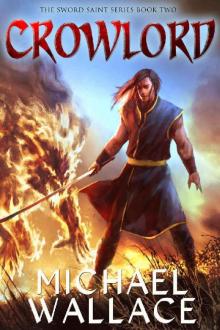 Crowlord (The Sword Saint Series Book 2)
Crowlord (The Sword Saint Series Book 2) Crowlord
Crowlord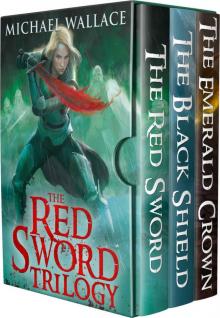 The Red Sword- The Complete Trilogy
The Red Sword- The Complete Trilogy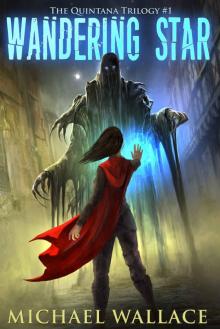 Wandering Star (The Quintana Trilogy Book 1)
Wandering Star (The Quintana Trilogy Book 1)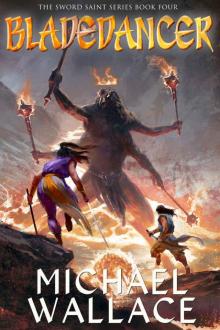 Bladedancer
Bladedancer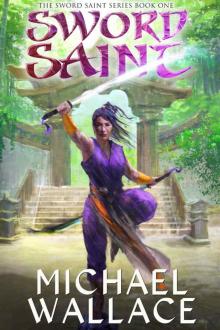 Sword Saint
Sword Saint The Alliance Trilogy
The Alliance Trilogy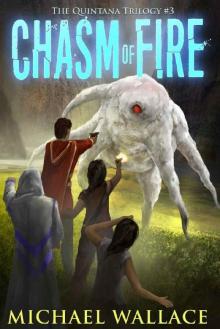 Chasm of Fire
Chasm of Fire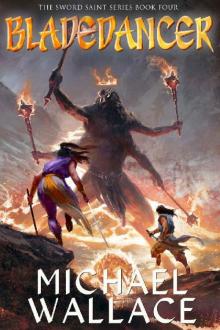 Bladedancer (The Sword Saint Series Book 4)
Bladedancer (The Sword Saint Series Book 4) The Devil's Deep
The Devil's Deep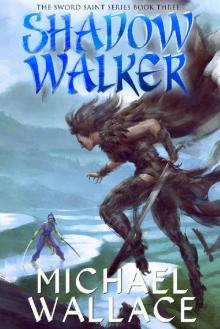 Shadow Walker (The Sword Saint Series Book 3)
Shadow Walker (The Sword Saint Series Book 3) Starship Blackbeard
Starship Blackbeard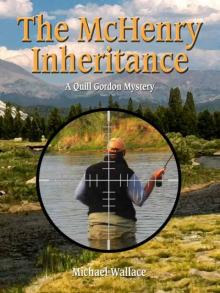 The McHenry Inheritance (Quill Gordon Mystery Book 1)
The McHenry Inheritance (Quill Gordon Mystery Book 1) Sun King (The Void Queen Trilogy Book 3)
Sun King (The Void Queen Trilogy Book 3) Blood of Vipers
Blood of Vipers Righteous - 01 - The Righteous
Righteous - 01 - The Righteous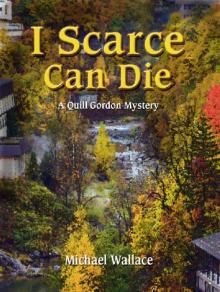 I Scarce Can Die (Quill Gordon Mystery Book 5)
I Scarce Can Die (Quill Gordon Mystery Book 5) The Devil's Cauldron
The Devil's Cauldron The Wicked (The Righteous)
The Wicked (The Righteous) Crow Hollow
Crow Hollow Righteous03 - The Wicked
Righteous03 - The Wicked Righteous02 - Mighty and Strong
Righteous02 - Mighty and Strong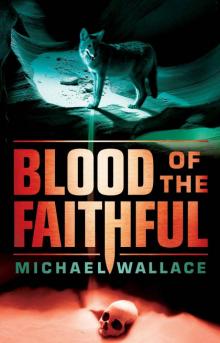 Blood of the Faithful
Blood of the Faithful Wash Her Guilt Away (Quill Gordon Mystery Book 2)
Wash Her Guilt Away (Quill Gordon Mystery Book 2) The Kingdom of the Bears
The Kingdom of the Bears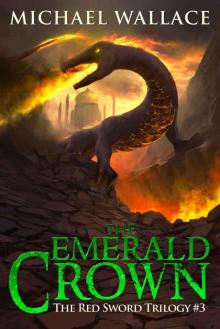 The Emerald Crown (The Red Sword Trilogy Book 3)
The Emerald Crown (The Red Sword Trilogy Book 3) The Dark Citadel
The Dark Citadel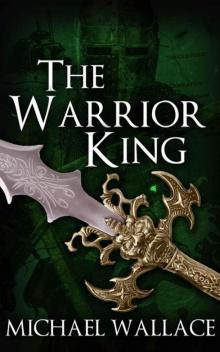 The Warrior King (Book 4)
The Warrior King (Book 4) Rebellion of Stars (Starship Blackbeard Book 4)
Rebellion of Stars (Starship Blackbeard Book 4) Righteous04 - The Blessed and the Damned
Righteous04 - The Blessed and the Damned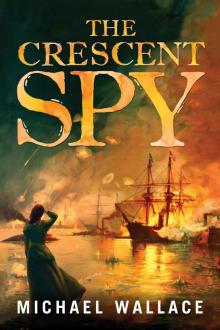 The Crescent Spy
The Crescent Spy Queen of the Void (The Void Queen Trilogy Book 1)
Queen of the Void (The Void Queen Trilogy Book 1)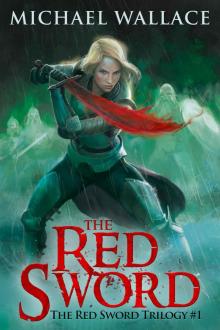 The Red Sword (The Red Sword Trilogy Book 1)
The Red Sword (The Red Sword Trilogy Book 1) The Sentinel (The Sentinel Trilogy Book 1)
The Sentinel (The Sentinel Trilogy Book 1) The Golden Griffin (Book 3)
The Golden Griffin (Book 3) The Blessed and the Damned (Righteous Series #4)
The Blessed and the Damned (Righteous Series #4) Hell's Fortress
Hell's Fortress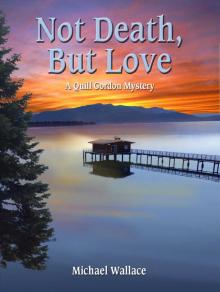 Not Death, But Love (Quill Gordon Mystery Book 3)
Not Death, But Love (Quill Gordon Mystery Book 3) Destroying Angel
Destroying Angel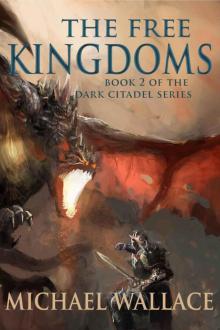 The Free Kingdoms (Book 2)
The Free Kingdoms (Book 2) Dragon Quadrant (The Sentinel Trilogy Book 2)
Dragon Quadrant (The Sentinel Trilogy Book 2) Shattered Sun (The Sentinel Trilogy Book 3)
Shattered Sun (The Sentinel Trilogy Book 3) The Wolves of Paris
The Wolves of Paris Lords of Space (Starship Blackbeard Book 2)
Lords of Space (Starship Blackbeard Book 2) Dreadnought (Starship Blackbeard Book 3)
Dreadnought (Starship Blackbeard Book 3) The Village of Dead Souls: A Zombie Novel
The Village of Dead Souls: A Zombie Novel The Black Shield (The Red Sword Book 2)
The Black Shield (The Red Sword Book 2) The Daughters Of Alta Mira (Quill Gordon Mystery Book 4)
The Daughters Of Alta Mira (Quill Gordon Mystery Book 4) Mighty and Strong (The Righteous)
Mighty and Strong (The Righteous)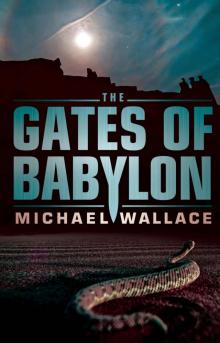 The Gates of Babylon
The Gates of Babylon